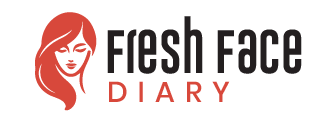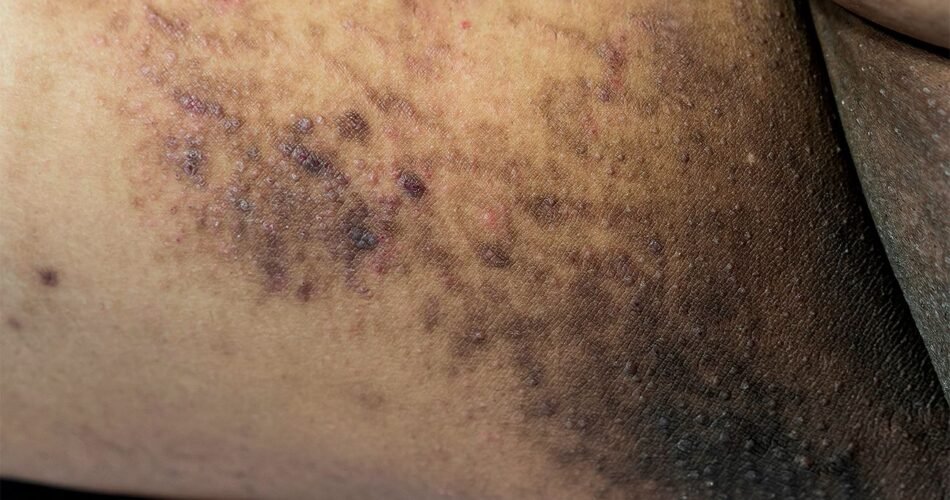Eczema and pimples can both affect your skin. But what if you have both?
These skin conditions can cause discomfort and frustration. Eczema leads to dry, itchy patches, while pimples cause red, inflamed spots. Having both at the same time can be challenging. Eczema and pimples are common skin issues. Each has its own triggers and treatments.
Eczema often comes from dry skin and allergies. Pimples usually result from clogged pores and bacteria. Managing both requires a careful approach. You need to keep your skin moisturized, but also avoid pore-clogging products. In this blog post, we’ll explore how to handle both conditions. You’ll learn about causes, treatments, and tips for better skin health. Stay with us to find solutions that can work for you.

Eczema And Pimples: An Uncommon Duo
Eczema and pimples are skin conditions that most people experience separately. But what happens if you have both? It sounds unusual, yet some people deal with this uncommon duo. Understanding why this occurs can help in managing these skin issues better.
Common Misconceptions
Many believe eczema and pimples can’t appear together. This is not true. These conditions can coexist. People often think eczema is only dry skin. But it can also cause itchy, inflamed patches. Pimples, on the other hand, are seen as a teenage problem. Yet, adults can get them too.
Why They Occur Together
Skin can be complex. Eczema and pimples can both result from inflammation. Eczema may weaken the skin barrier. This can lead to clogged pores, causing pimples. Certain products might treat one issue but worsen the other. Stress is another factor. It can trigger both eczema and pimples.
Hormonal changes can also play a role. They can lead to both skin conditions appearing together. Knowing these factors helps in finding the right treatment.
Causes And Triggers
Understanding the causes and triggers of eczema and pimples can help manage these skin conditions better. Both conditions have different causes but sometimes share common triggers. Knowing these can help in taking preventive steps.
Genetics And Hormones
Genetics play a significant role in both eczema and pimples. If your parents had eczema or acne, you are more likely to have them too. Hormones also affect these conditions. During puberty, hormonal changes can lead to more pimples. Eczema can flare up due to hormonal changes during pregnancy or menstrual cycles.
Environmental Factors
The environment around you can impact your skin health. Factors such as pollution, extreme weather, and allergens can trigger both eczema and pimples. Dry air can cause eczema to flare up, while humid conditions can lead to more pimples.
Here is a table summarizing some common environmental triggers:
| Trigger | Eczema | Pimples |
|---|---|---|
| Pollution | Yes | Yes |
| Extreme Weather | Yes | No |
| Allergens | Yes | No |
Certain lifestyle habits can also trigger eczema and pimples. Stress and lack of sleep can worsen both conditions. A balanced diet and regular exercise can help improve your skin health.
Symptoms And Identification
Eczema and pimples together can cause red, itchy, and inflamed skin. Identifying both involves noticing dry patches and small, pus-filled bumps. Consult a dermatologist for accurate diagnosis.
Understanding the symptoms of eczema and pimples is crucial for proper care. Both conditions affect the skin but have different characteristics. Identifying them correctly helps in choosing the right treatment.
Eczema Symptoms
Eczema often appears as red, inflamed patches on the skin. It can be itchy and uncomfortable. The skin may become dry, cracked, and even bleed. Eczema is usually found on the hands, neck, and behind the knees. Flare-ups can vary in severity. Triggers include stress, allergens, and irritants.
Pimple Characteristics
Pimples are small, raised bumps on the skin. They may be red, inflamed, or filled with pus. Pimples usually appear on the face, chest, and back. They occur when hair follicles become clogged with oil and dead skin cells. Hormonal changes and bacteria can worsen pimples. Unlike eczema, pimples are often isolated or in small clusters.
“`
Impact On Daily Life
Having both eczema and pimples can significantly impact daily life. These skin conditions cause physical discomfort and emotional stress. Daily routines may change to manage symptoms, affecting overall well-being.
Physical Discomfort
Dealing with eczema and pimples often leads to constant itching and painful breakouts. The skin becomes sensitive, making it hard to focus on daily tasks. Applying creams, taking medications, and avoiding triggers becomes a routine.
For example, certain fabrics or weather conditions can worsen symptoms. This requires individuals to be cautious about clothing choices and outdoor activities.
| Triggers | Impact |
|---|---|
| Wool Fabrics | Increased Itching |
| Hot Weather | More Breakouts |
| Stress | Flare-Ups |
Emotional And Social Effects
Having both conditions can lead to emotional distress. People may feel embarrassed about their skin, affecting self-esteem. Social interactions can become stressful due to fear of judgment.
For instance, avoiding social gatherings or using makeup to hide breakouts may become common. This can lead to feelings of isolation and loneliness.
- Low self-esteem
- Fear of social judgment
- Avoidance of social events
Managing eczema and pimples requires a holistic approach. This includes medical treatment, lifestyle changes, and emotional support. Understanding the impact on daily life helps in creating effective coping strategies.
Skincare Routine Adjustments
Balancing eczema and pimples can be tricky. Both need special care. Finding a routine that works for both is key. Adjusting your skincare can make a big difference.
Gentle Cleansing
Choose a mild cleanser. Harsh cleansers can irritate eczema and pimples. Look for fragrance-free options. Avoid scrubbing your skin. Pat your face dry with a soft towel.
Wash your face twice daily. This helps keep pimples at bay. It also avoids drying out your eczema-prone skin.
Moisturizing Techniques
Moisturizing is crucial. Use a non-comedogenic moisturizer. This won’t clog your pores. Look for ingredients like ceramides and hyaluronic acid. These help soothe eczema.
Apply moisturizer after cleansing. This locks in moisture. Use a thicker cream at night. This gives extra hydration while you sleep.

Credit: balmonds.co.uk
Medical Treatments
Dealing with both eczema and pimples can be challenging. The good news is that medical treatments can help. These treatments can target both skin conditions effectively.
Topical Medications
Topical medications are often the first line of treatment. They include creams, ointments, and gels. For eczema, doctors may prescribe corticosteroid creams. These reduce inflammation and itching. Non-steroid creams like calcineurin inhibitors can also help. They are gentler on the skin.
For pimples, topical treatments often contain benzoyl peroxide or salicylic acid. These ingredients help unclog pores and reduce bacteria. Retinoids are another option. They promote cell turnover and prevent clogged pores. It’s important to apply these creams as directed.
Oral Prescriptions
Sometimes, topical treatments aren’t enough. Oral prescriptions can help. For eczema, doctors may prescribe antihistamines. These reduce itching and help with sleep. In severe cases, oral corticosteroids might be necessary. They control inflammation throughout the body.
Oral antibiotics can be effective for pimples. They reduce bacteria and inflammation. For severe acne, doctors may prescribe isotretinoin. This powerful medication reduces oil production. It also prevents clogged pores and reduces bacteria. Always follow your doctor’s advice when taking oral medications.
Natural Remedies And Alternatives
Dealing with both eczema and pimples can be a real challenge. But there are natural remedies and alternatives that can help soothe your skin. These options can often be gentler than traditional treatments. They can help manage symptoms without harsh chemicals. Let’s explore some effective natural remedies.
Herbal Solutions
Many herbs have soothing properties. They can help calm eczema and pimples. Chamomile is one such herb. It can reduce inflammation and redness. Tea tree oil is another popular choice. It has antibacterial properties that can fight acne. Always dilute essential oils before applying them to your skin.
Aloe vera is excellent for both eczema and pimples. It hydrates the skin and reduces irritation. Calendula is also beneficial. Its anti-inflammatory properties can help soothe eczema flare-ups and reduce acne.
Diet And Nutrition
What you eat can affect your skin. A balanced diet can help manage eczema and pimples. Include foods rich in omega-3 fatty acids. These can reduce inflammation. Good sources include fish, flaxseeds, and walnuts.
Avoid foods that can trigger eczema or acne. These include dairy, sugar, and processed foods. Instead, focus on a diet rich in fruits and vegetables. They provide essential vitamins and antioxidants that promote healthy skin.
Here’s a quick reference table for foods to include and avoid:
| Foods to Include | Foods to Avoid |
|---|---|
| Fish (Salmon, Mackerel) | Dairy Products |
| Flaxseeds | Sugar |
| Walnuts | Processed Foods |
| Fruits and Vegetables | Fried Foods |
Preventive Measures
Dealing with eczema and pimples at the same time can be challenging. Preventive measures can help manage both conditions effectively. By understanding what triggers flare-ups and adopting a consistent skincare routine, you can keep your skin clear and healthy.
Avoiding Triggers
Identifying and avoiding triggers is crucial. Common triggers for eczema include harsh soaps, detergents, and stress. For pimples, triggers often include oily or greasy products, certain foods, and stress. Keep a diary to track potential triggers. This helps in avoiding them in the future.
Choose gentle, fragrance-free skincare products. These reduce the risk of irritation. Stress management techniques like yoga and meditation can also be beneficial.
Long-term Skincare Strategies
A consistent skincare routine is vital. Cleanse your face twice daily with a mild cleanser. This removes dirt and excess oil without stripping natural moisture.
Moisturize regularly to keep your skin hydrated. Choose a non-comedogenic moisturizer. This ensures it won’t clog pores. For eczema-prone areas, use thicker, emollient creams.
Consider consulting a dermatologist. They can recommend specific treatments. This may include medicated creams or oral medications.
Avoid over-exfoliating. This can irritate both eczema and pimple-prone skin. Use a gentle exfoliator once a week at most.
Seeking Professional Help
Dealing with both eczema and pimples can be frustrating. Managing these conditions on your own may seem overwhelming. Seeking professional help can provide relief and a clear treatment plan.
When To See A Dermatologist
Not sure if you need a dermatologist? Here are some signs:
- Severe itching or discomfort.
- Frequent flare-ups of eczema.
- Pimples that do not respond to over-the-counter treatments.
- Skin infections or open sores.
- Significant impact on your daily life.
A dermatologist can help you find relief and prevent further issues.
What To Expect From Consultations
During your first visit, the dermatologist will:
- Ask about your medical history.
- Examine your skin.
- Discuss your symptoms.
- Suggest possible triggers.
They may also recommend:
- Prescription medications.
- Topical treatments.
- Special skincare routines.
- Allergy testing.
Follow-up visits are often needed to monitor progress.
Seeking professional help is key in managing eczema and pimples effectively. A dermatologist can guide you towards healthier skin.
Frequently Asked Questions
What Causes Eczema And Pimples Together?
Eczema and pimples can occur together due to genetic predisposition and environmental factors. Stress, hormones, and skincare products can also contribute.
How To Manage Eczema And Pimples Simultaneously?
Managing both requires gentle skincare routines. Use non-comedogenic moisturizers and avoid harsh chemicals. Consult a dermatologist for personalized treatment.
Can Diet Affect Eczema And Pimples?
Yes, diet can influence both conditions. Avoiding dairy, sugary foods, and processed items may help reduce flare-ups and breakouts.
Are There Any Specific Skincare Products For Both?
Look for products labeled for sensitive and acne-prone skin. Non-comedogenic, fragrance-free moisturizers and gentle cleansers are ideal.
Conclusion
Managing eczema and pimples together can feel overwhelming. Simple care routines help. Use gentle products. Moisturize regularly. Avoid harsh treatments that irritate skin. Consult a dermatologist for personalized advice. Stay patient and consistent. Healthy skin takes time. Remember, you’re not alone.
Many face this challenge. A balanced approach brings relief. Take it one step at a time. Your skin can improve with care. Keep hope alive.

